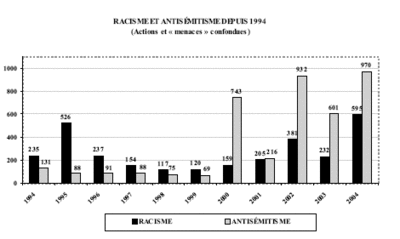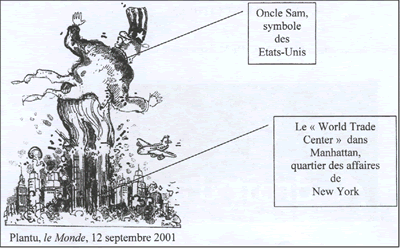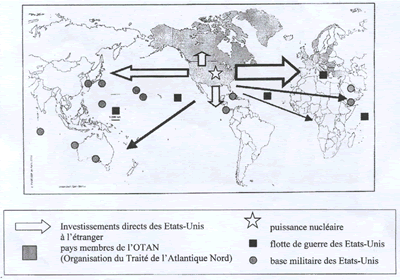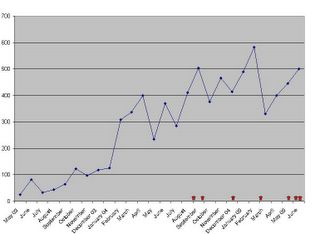(With THREE Updates)From yesterday’s (8 July) edition of
Ivan Rioufol’s indispensable weekly “notebook” in Le Figaro:
The following figured among the essay questions in the final exam in history and geography given in French junior high schools [collèges] last week, i.e. to 14-15 year old students:
“How was American power contested on September 11, 2001?”
This amounts to presenting the Islamist attacks against the world’s greatest democracy ... as one form of contestation among others. A good illustration of the training in anti-Americanism provided by the Ministry of Education.
The original French version of the topic reads: “
Comment la puissance américaine a-t-elle été contestée le 11 septembre 2001?” In order to provide the grammatically most similar English rendering and avoid charges of tendentiousness, I have used the English cognate "[to] contest". But in current French usage the verb
contester bears a very strong connotation of political protest and, notably, protest against a given political order: it implies not just a “challenge” – a term which is politically comparatively neutral – but a challenge to legitimacy. Thus the question could just as well be understood as "How was American power protested against on Septmber 11, 2001?". The French expression for “protest” as a mass phenomenon is indeed
la contestation. For instance, Le Monde Diplomatique titled an August 2002 article on the anti-G8 demonstrations in Genoa the previous July as
“Criminaliser la contestation”: i.e. “Criminalizing Protest”. In a similar vein, Le Monde proper, in the passage from its editorial on the London bombings that I cited in
my last post, speaks admiringly of the “anti-globalization” demonstrators’ “
contestation de l’ordre établi”: “protest of the established order”.
Le Monde Diplomatique – an authoritative reference for “anti-globalization” militants worldwide – was, incidentally, one of the first French publications to present 9/11 as, in effect, precisely a form of “contestation”. As I have discussed in
“The Legend of the Squandered Sympathy”, its first issue following the 9/11 attacks bore the thematic headline “Boomerang Effect”, implying in not so subtle terms that the USA had got what it had coming.
(Note: Though I have not been able to view the exam – the links to it, such as
this one, that I have found on the web do not currently work – a contributor to
a forum hosted by Le Figaro notes that the question was accompanied by an editorial cartoon by Plantu, Le Monde’s star cartoonist. This is very telling, since as I have had repeated occasion to document on Trans-Int – see
here (“The Legend”) in connection with 9/11 and, more recently,
here in the context of the London G8 summit – Plantu has long made anti-American incitement his specialty.)
Update:Courtesy of the French-language site Primo Europe, here is an image of the relevant exam sheet:
The "document" with which the question is associated is indeed a post-9/11 cartoon by Plantu. The cartoon depicts the World Trade Towers as the legs of Uncle Sam. The plane crashing into the towers is, in effect, cutting the legs of Uncle Sam out from under him.
Update #2:The same Plantu cartoon appears in a study guide supposed to help students prepare for the exam in history and geography:
 (click on image for larger version and see here [pdf-file] for the full page of the study guide in question)
(click on image for larger version and see here [pdf-file] for the full page of the study guide in question)The Plantu cartoon, which was published on 12 September 2001 (Le Monde is published on the day prior to the date that appears on its masthead), provided the visual counterpart of a view that was given large and varied expression in the pages of Le Monde in the days and weeks following 9/11: viz., that American power had been, as the study guide puts it, "
ébranlé" - "shaken" or "fragilized" - or, in other words, that the terrorists had, in effect, achieved their presumed objective and handed the American Colossus a "defeat". Thus, for instance, in the same spirit Le Monde ran an article in its 20 September edition titled "Shaken [
ébranlés], New Yorkers question themselves about the basis of their lost grandeur". (See
"The Legend of the Squandered Sympathy" for a discussion.) Of course, so soon after the events, it was by no means obvious that America had been "fragilized", much less that New York had lost its "grandeur". Hence, the oddly precipitate conclusion must have reflected a sort of wish-fulfillment. This perhaps explains the rage that was provoked within the same milieus when the US responded vigorously to the attacks.
Update #3:In his cartoon, Plantu no doubt meant to allude to the proverbial clay feet of the giant in Nebuchadnezzar's dream: an allusion that makes the perverse wish-fulfillment all the more clear. A similar "inspiration" is seemingly at work in Plantu's latest effort for the weekly L'Express (yes, Plantu is so well appreciated in the French publishing world that he has multiple employers) that depicts a bearded Islamist stealing away with the banner "Dieu et Mon Droit" ("God and My Right") from the British Coat of Arms.
On the blog Mesperles [link in French], a French schoolteacher has recorded how some of his students interpreted the Plantu cartoon:
"Uncle Sam is in the process of destroying the World Trade Center."
"Uncle Sam is trampling on the Twin Towers"
"The World Trade Center was not destroyed by the planes, but because the Americans built it too high."
And perhaps most revealingly of all:
"It is not the plane that killed the thousands of people, but rather Uncle Sam."








